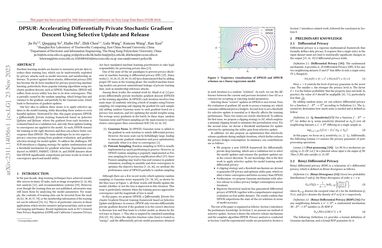DPSUR: Accelerating Differentially Private Stochastic Gradient Descent Using Selective Update and Release
Machine learning models are known to memorize private data to reduce their training loss, which can be inadvertently exploited by privacy attacks such as model inversion and membership inference. To protect against these attacks, differential privacy (DP) has become the de facto standard for privacy-preserving machine learning, particularly those popular training algorithms using stochastic gradient descent, such as DPSGD. Nonetheless, DPSGD still suffers from severe utility loss due to its slow convergence. This is partially caused by the random sampling, which brings bias and variance to the gradient, and partially by the Gaussian noise, which leads to fluctuation of gradient updates. Our key idea to address these issues is to apply selective updates to the model training, while discarding those useless or even harmful updates. Motivated by this, this paper proposes DPSUR, a Differentially Private training framework based on Selective Updates and Release, where the gradient from each iteration is evaluated based on a validation test, and only those updates leading to convergence are applied to the model. As such, DPSUR ensures the training in the right direction and thus can achieve faster convergence than DPSGD. The main challenges lie in two aspects -- privacy concerns arising from gradient evaluation, and gradient selection strategy for model update. To address the challenges, DPSUR introduces a clipping strategy for update randomization and a threshold mechanism for gradient selection. Experiments conducted on MNIST, FMNIST, CIFAR-10, and IMDB datasets show that DPSUR significantly outperforms previous works in terms of convergence speed and model utility.
PDF Abstract



 CIFAR-10
CIFAR-10
 Fashion-MNIST
Fashion-MNIST
 IMDb Movie Reviews
IMDb Movie Reviews